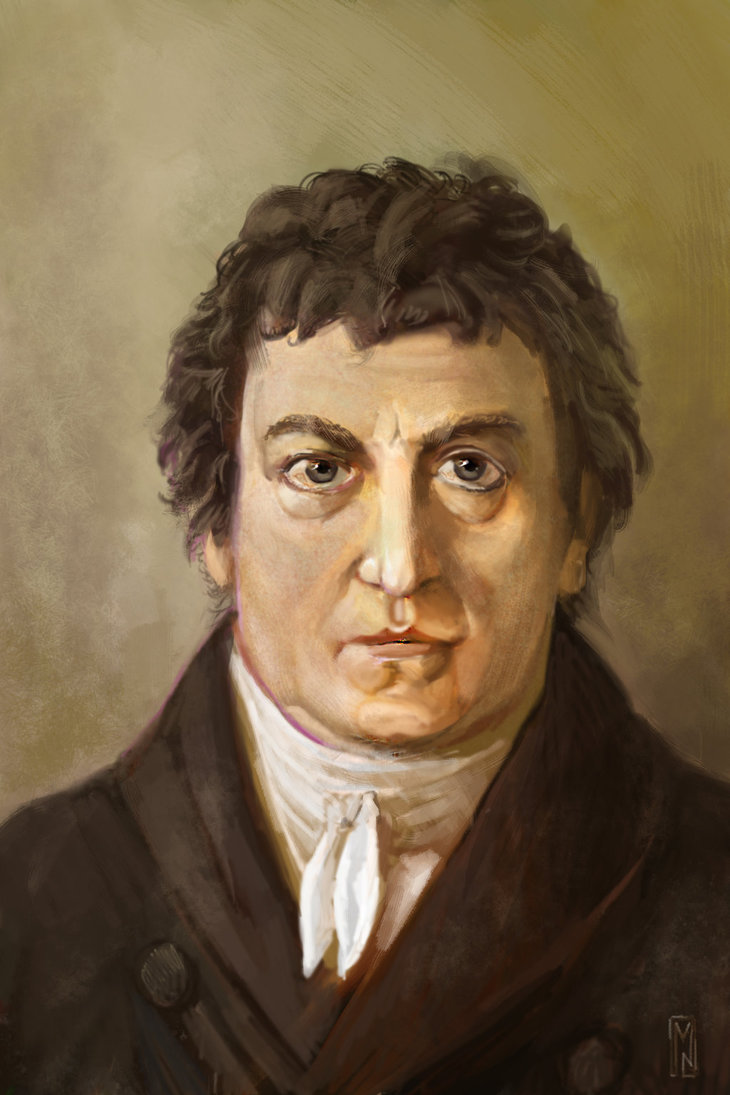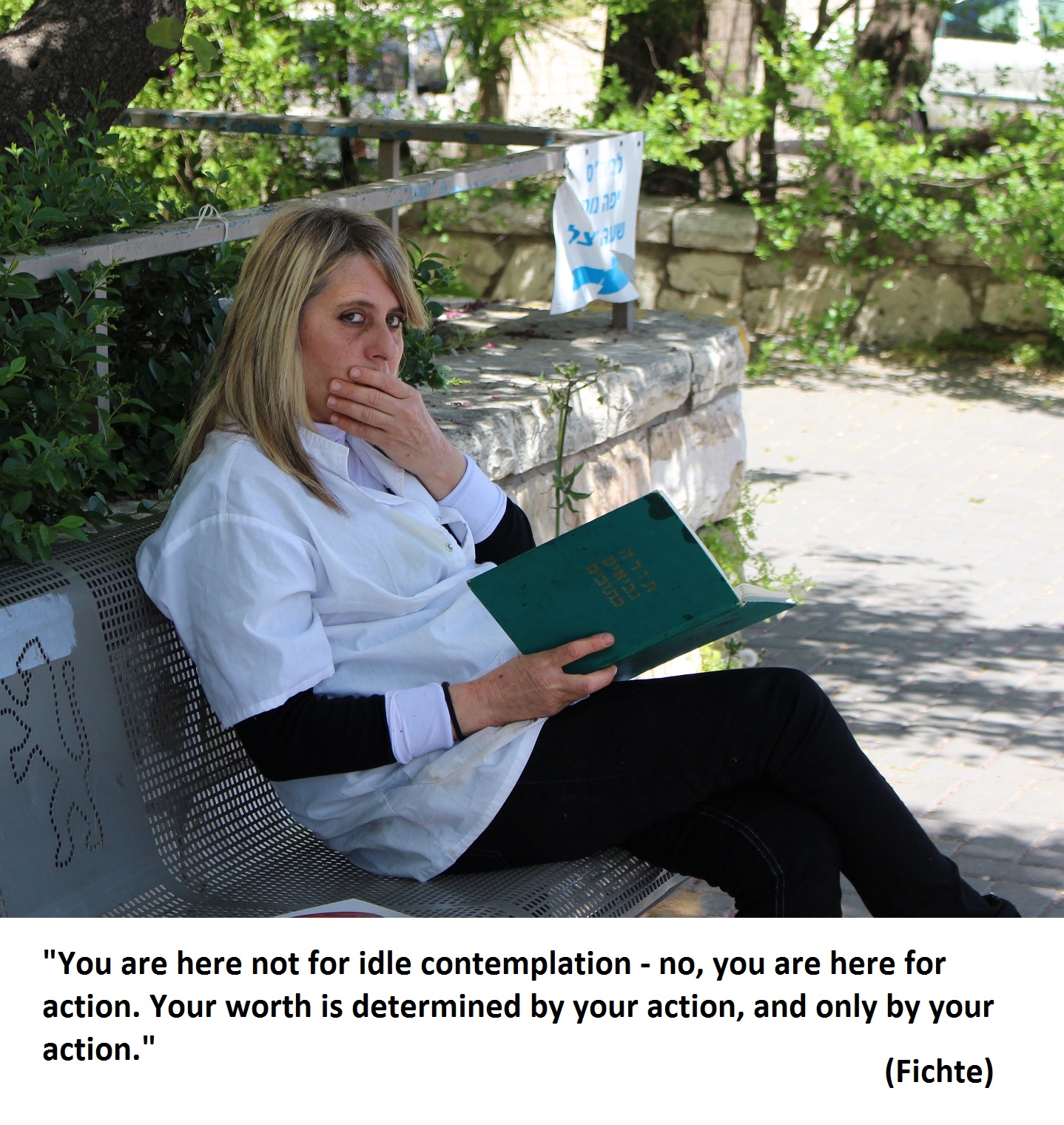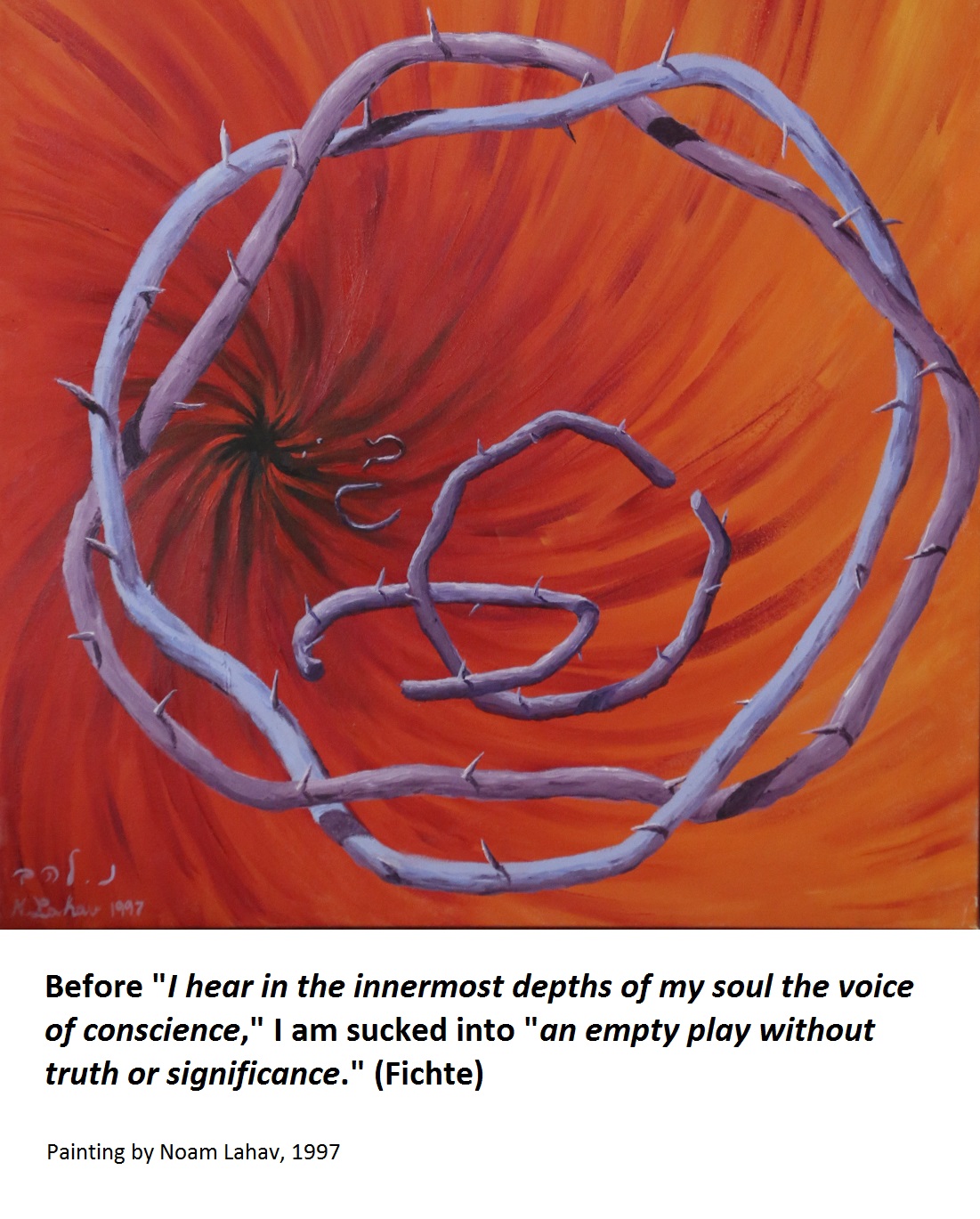|
THE VOICE OF CONSCIENCE
 Johann Gottlieb Fichte (1762–1814) was a major German philosopher, considered to be the founder of German idealism, a philosophical movement of the 18th-19th centuries that revised ideas from Kant’s philosophy. Fichte wrote about a variety of topics, including knowledge, the self, consciousness, religion and morality. For several years he was very influential among German philosophers, but later in his life his popularity declined, eclipsed by Hegel’s influence. Johann Gottlieb Fichte (1762–1814) was a major German philosopher, considered to be the founder of German idealism, a philosophical movement of the 18th-19th centuries that revised ideas from Kant’s philosophy. Fichte wrote about a variety of topics, including knowledge, the self, consciousness, religion and morality. For several years he was very influential among German philosophers, but later in his life his popularity declined, eclipsed by Hegel’s influence.
Fichte was born to a simple family, but he was sent to study in good schools by a local landowner who was impressed by his intellectual abilities. For several years he lived in poverty until, shortly after he married, he was invited to lecture at the important University of Jena. There he suddenly became successful and popular both as a writer and lecturer. During his Jena period, between 1794-1799, he wrote most of his influential books, some of them scholarly and some to the general public. After he was accused of atheism, he moved to the University of Berlin, where he published in 1800 The Vocation of Man, from which the text below is taken, as well as other works. He died from Typhus at the age of 51.
The following text is adopted from Fichte’s book The Vocation of Man, published during his Berlin period in 1800. It deals with the issue of how we can know the world, as well as the issue of our vocation. The first two parts (or “books”) lead to the conclusion that the world might not have independent reality, since it might consist only of representations in my mind. This implies that my life and actions are meaningless. In response to this problem, the third and last book suggests that instead of searching for general systems of understanding I should look into myself. I will then find inside me my will to act, and my moral conscience that tells me how to act. Abstract reasoning cannot prove that this inner call of conscience is real. However, through faith I can accept that my life is not just a meaningless delusion, and that I have a moral duty which I am really called to fulfill – a moral duty that also involves respect for the lives and freedom of others.
In this sense, faith in the voice of my conscience within me – in other words, faith in my moral duty – is more basic than reason-based knowledge. On the basis of this faith, I come to accept that the world is real, that I belong to a higher world, and that my vocation in life is to obey this higher call.
From Book III – “Faith”
“Your vocation is not just to know, but according to your knowledge to act!” — this is what I hear in the innermost depths of my soul, as soon as I recollect myself for a moment, and reflect upon myself. “You are here not for idle contemplation of yourself, not for brooding over your experiences — no, you are here for action. Your worth is determined by your action, and only your action.”
 This voice leads me from mere cognition to something which lies beyond it, and is entirely opposed to it: to something which is greater and higher than all knowledge, and which contains the purpose of all knowledge. This voice thus announces to me precisely what I was looking for: something beyond mere knowledge, and completely independent of it. This voice leads me from mere cognition to something which lies beyond it, and is entirely opposed to it: to something which is greater and higher than all knowledge, and which contains the purpose of all knowledge. This voice thus announces to me precisely what I was looking for: something beyond mere knowledge, and completely independent of it.
This is how it is, I know it immediately. But since I have once entered the domain of speculation, the doubt which has been awakened within me secretly continues to disturb me. […] I have to ask myself: Is this really true? From where comes that voice in my soul which directs me to something beyond mere appearances and knowledge?
[...]
Shall I then refuse to accept that inward voice? I will not do so. I will freely accept the vocation which this impulse gives me. And in this decision I will immediately hold this thought, in all its reality and truthfulness, and the reality of all the things which this thought presupposes. […]
I have found the organ with which to understand this reality, and probably all other reality. This organ is not knowledge — no knowledge can be its own foundation, its own proof. Every knowledge presupposes another higher knowledge on which it is based, and so on with no end. It is faith that voluntarily accepts the view which naturally appears to us, because only through this view we can fulfill our vocation. This produces knowledge, and raises to certainty and conviction its basis: not knowledge, but a resolution of the will to admit the validity of knowledge.
[...]
This voice of my conscience announces to me precisely what I must do and what I should not do in every particular situation of life. It accompanies me, if I only listen to it with attention, through all the events of my life, and it never frustrates me where I am called to act. It carries with it immediate conviction, and irresistibly forces me to agree to its commands – it is impossible for me to oppose it. To listen to it, to obey it honestly and with no reservation, without fear or evasion — this is my true vocation, the whole purpose of my existence. My life stops being an empty play without truth or significance.  There is something that must absolutely be done for its own sake alone. What conscience demands of me in this particular situation of life is mine to do, and this is why I am here. To know it, I have understanding; to perform it, I have power. Only through this conscience, truth and reality enter into my conceptions. I cannot refuse them my attention and my obedience without surrendering the purpose of my own existence. There is something that must absolutely be done for its own sake alone. What conscience demands of me in this particular situation of life is mine to do, and this is why I am here. To know it, I have understanding; to perform it, I have power. Only through this conscience, truth and reality enter into my conceptions. I cannot refuse them my attention and my obedience without surrendering the purpose of my own existence.
[...]
But the voice of my conscience says: “Whatever these [other human] beings may be by themselves, you should act towards them as self-existent, free, substantive beings, wholly independent of you. Assume that they can give a purpose to their own being wholly by themselves, and quite independently of you. Never interrupt this purpose, but rather further it as much as you can. Honor their freedom, lovingly take care of their purposes as if they were your own.” This is how I should act. All my thoughts must be guided by this course of action — it will be so, and must necessarily be so, if I have decided to obey the voice of my conscience.
|